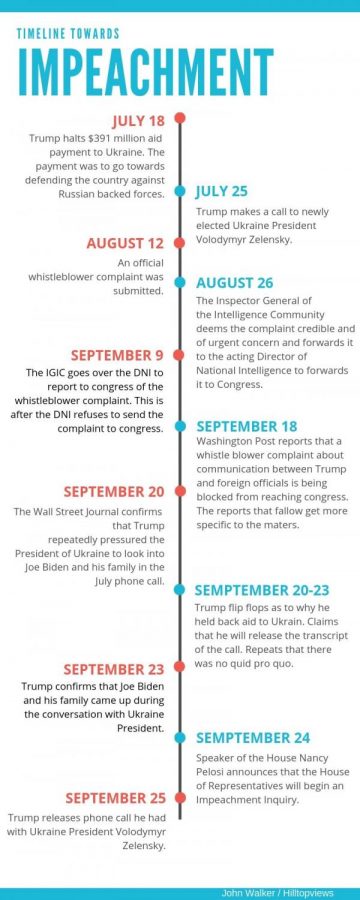Impeachment inquiry raises questions between Democrats and Republicans
On Sept. 24, Speaker of the House Nancy Pelosi announced that the House of Representatives would start an official impeachment inquiry of President Donald Trump.
According to The Washington Post, a whistleblower filed a complaint about phone calls with President Donald Trump and foreign leaders. The acting Director of National Intelligence blocked the complaint from reaching Congress.
It came to light when Trump talked to the president of Ukraine, Volodymyr Zelensky. Trump asked Zelensky to work with his attorney Rudy Giuliani on a probe into Former Vice President Joe Biden.
David Thomason, a political science professor at St. Edward’s, says that the impeachment process is a part of the checks and balance system written in the Constitution.
“Congress has the authority to decide whether or not presidential behavior or actions are outside the boundaries of the constitutional authority,” Thomason says.
Nicholas Long is also a political science professor at St. Edward’s, and he compares impeachment to being “charged with a crime.”
“That doesn’t mean that you automatically go to prison. You have to stand trial and the evidence has to be proven. Impeachment is the first part, it’s charging a president with a crime,” Long adds.
The Senate voted on two of the last three impeachment proceedings. In the past, both President Andrew Johnson and Bill Clinton were charged with a crime during their impeachment, but they were ultimately not removed from office.
In order for an impeachment to go through, the Senate must prove the evidence and vote on removal in a supermajority, which requires 67 votes.
“Impeachment is a political process, not a judicial process. You always have to factor in political considerations. Even though those 100 senators are supposed to be neutral jurors, that’s not the case,” Long says.
“A challenge for Democrats, who are trying to build momentum towards impeachment and removal, is they are going to have to figure out how to keep the narrative compelling enough that people will tune in if they have other options,” Long says.
Vice President Mike Pence and Attorney General William Barr are among the officials listed in the whistleblower complaint. The more people involved in the inquiry, the better the Democrats’ case for impeachment.
“You need 20 republicans to defect. In our current polarized system, it’s hard to see where Republicans would defect from Trump. It only takes one or two leaving and suddenly the wall crumbles,” Long says.
Thomason says that Congress is setting a precedent by not allowing Trump or any president to act in the way outlined in the whistleblower complaint.
“The Constitution is only as good as the institutions that implement that constitution. If impeachment were consistently being used, it would become a meaningless power. But because it’s used so infrequently, it puts a lot more weight on the decisions that presidents make outside of that boundary,” Thomason says.

MY name is John Walker, and I am one of the Life and Arts Section Editors. I'm a senior Communication major and journalism minor from Los Angeles, California....







